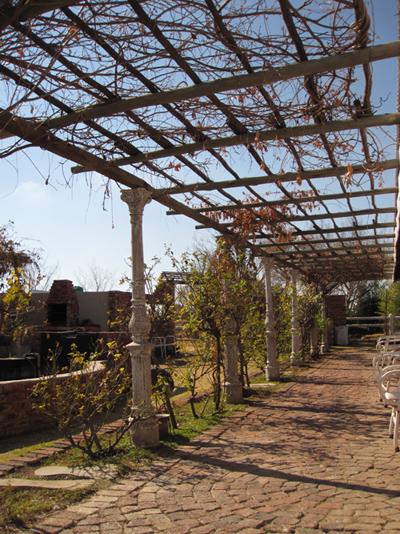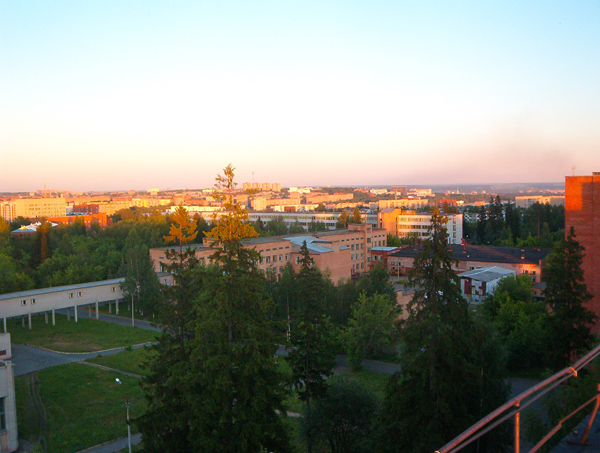Izhevsk, Russia, home to roughly 630,000 steely-eyed Slavs and the proud birthplace of the AK-47, is not the capital of much. It is, however, the industrial, cultural, and administrative hub of a place called the Udmurt Republic, whose eponymous ethnic group may or may not have the reddest hair in the world. The city’s legendary Soviet weapons outlet — Izhevsk Machine-building Plant or simply “Izhmash” for the inducted — is now bankrupt, and its website reads like a study in the what-not-to-do’s of technical translation: “A great potential and a unique two-hundred-year expertise of the Concern ‘Izhmash’ designers and engineers have made it possible for the recent decade to develop the production of sporting and hunting firearms including a bipod for rifle within the conversion program.” There is a man-made pond there, and an ethnographic museum. For one summer, there was me.
Moscow or St. Petersburg would have been more obvious stages for the spectacle of learning Russian. Too obvious, I thought at eighteen, and swarming with undercover English speakers who would greet my halting pleas for directions with a prompt, unwelcome code-switch. I wanted the real deal, going native, to be sucked dry from the inside by and of this hard-knocks place — not the glossy cupolas of Red Square. For the most part, my plan worked: I was beat with a birch branch in a rural banya; I drank hot tea from a saucer in the peasant tradition; I learned to talk tough about dead dogs left to rot in the street. My Russian grew full of studied fillers (“bozhe moi!”, good God!) meant to reflect a determinedly unstudied mien.
Ten years later, three years give-or-take into learning Afrikaans from the unlikely setting of New Haven, Connecticut, I set out to take another linguistic plunge. As far as I could gather, though, there were no homestays, language exchanges or summer programmes that might allow me to recreate my golden era of provincial authenticity. Letters to Free State boers tracked down through a farmworkers’ website yielded no leads; my university email address doubtless killed any illusion that I had a way with sheep. So when the chance arose to hold forth on the charms of literary-historical isolation at a conference in Potchefstroom, I jumped to book a flight. I would trade Kalashnikov rifles for the Mooirivier Mall, hot in pursuit of the familiar high of insider lingo: “Sien jou in Potch, Jeanne-Marie,” epicentre of the mysterious North West province.
But while my journey from the mostly-inside to the really-inside of Russia had unfolded over a leisurely day-long train ride, the shift from Cape Town to a Potch gastehuis occurred in fits and starts. In between every nap to ward off jetlagged hallucination, I’d find myself in a new seat in a new space: an airplane, a hired car, an ice-cold room in a North-West

My Afrikaans laboratory-cum-"country estate" in sunny Potchefstroom
University “village” built for conferences and athletes. Conversations turned hospitably toward my future travels in Africa. Wouldn’t I like to immerse myself in cool Namibian waters, then lie naked on a bed to feel the warm breeze on my skin? You know, for the sensory contrast? So suggested my doughy Potchefstroomian driver, himself a transplant from the country of many temperatures. Beslis, ja, I answered, that sounds very, very nice.
Once, I fell asleep in an Izhevsk taxi muttering about Tolstoy, on my way home from a dance club and porn theatre built in a former bomb shelter, and woke up in a sixth floor apartment. But the people there were the same as the night before, the surroundings made sense, we sipped tea to dilute the vodka in our veins. If one’s grasp of a place can be measured in minutes of disorientation upon opening your eyes in a strange room, then my sense of South Africa is less legible. For starters there is no taxi to deliver me from the SAVAL conference to my new Potchefstroom residence - the place I have chosen as my home base for learning Afrikaans - at about 2:00 p.m. on a sunny June day, and I never see who opens the holy gates for the kindly colleague who does give me a lift. A deferential black man in paint-spattered clothes points me toward a hollow-feeling suite; I consciously override my urge to pin him with some literary allusion. “Thanks so much! Do you speak English?” Only some sort of muttering about work. “Baie dankie, praat u Afrikaans?” More deference, some pacing, confusion, then he leaves. I crawl under the covers of the largest of three beds, still in my dress from the academic lunch just concluded. I don’t know whether the door is locked, or care.
I’m awoken by the staccato, unintelligible speech of a man near my bed. It is not an invitation to converse. My dress has risen up my thighs — he can’t see it, but I know — and I raise my head slightly from the pillow. Americans are a cheerful bunch and we sure don’t like to be racist (we’re post-race, you may have heard), so I opt to stay in bed as if this is a run-of-the-mill interaction. “Oh, hi! I was just taking a nap, if that’s ok?!” The man who I swear to myself reminds me nothing of Gordimer’s July does not turn around, he does not answer, he does not look. It strikes me that a bomb shelter-turned-porn theatre is a much more likely place to doze off than this room full of country kitsch. “Wil jy he ek moet uitgaan?” I cringe at having used the informal “you” — a bad enough slip in Russian or French, where my racial bona fides are not on the line.
Another man enters. Clearly something is wrong with the room, something in the corner, but it’s not my prerogative to know what it is. I calculate that I have two strategies open to me in making the point that I’m unphased, because after all I’m a visitor in this country and these men are just doing their jobs. I can feign some more sleep, or get up and mosey around the suite and offer them some of the tea I happen to be making. Neither of these things occurs, though, because an old white guy strides in at my moment of indecision, and I don’t know where the tea is. Is this the baas? Can I still think the word baas? “I was actually taking a nap,” I try again, and now both ends of the rainbow nation ignore me.
As I slip out of bed to retreat to the kitchen, I am keenly aware of my bare, freshly pedicured feet. This isn’t because they mark some sort of false intimacy or a quasi-erotic intrusion, as I glance from my toes to the ballet flats that I kicked off en route to peeling down the comforter. Rather, I am at a loss as to how the deep voices and big hands just a few yards away are impervious to the flashes of pink now padding around our shared space. I would coach my students to read this scene for the subtexts of which I now find disorientingly none. There is no tension, no awkward apology, no tacit tuning in to the cross purposes of one another’s presence. I call a friend in Cape Town and take pains to lower my voice as I describe the situation, knowing it makes no difference, that it is only a means of assuaging my own transparency. The men stay fifteen minutes more.
The entryway to my apartment building in Izhevsk — a typical 1960s cement block structure called a Krushchyovka — smelled like urine and meat. Its walls were graffitied and the boom of its heavy metal door echoed for what felt like

A view of Izhevsk's cozy "Krushchyovka" apartment buildings,
Kalashnikov rifles not pictured
minutes after slamming shut. Sometimes there was vomit on the floor, sometimes only dust. The view from my doorway in Potch was adorned with vines, and a fish pond, and a flock of guinea fowl, who swept across the ground like balloons that have run out of helium. Instead of concrete steps, there were cozy cloth chairs intended for afternoons spent reading in the shade of a citrus tree. And yet as I stood there contemplating how to get in, all I could think of was the line from July’s People about not knowing where you are, in time, in the order of a day as you have always known it. Even though I knew that book was not about me, and not about the strangers in my room.
 SLiPStellenbosch Literary Project
SLiPStellenbosch Literary Project 
Hallo! Lekker gelees -ek hoop part 2 volg spoedig! xxx